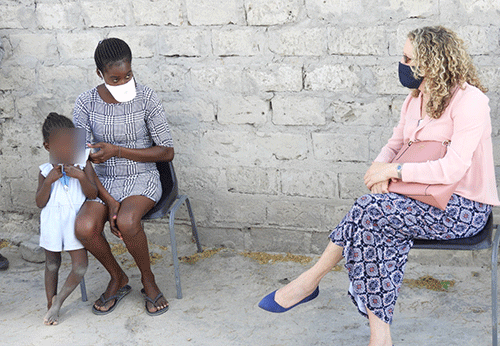Namibia has made great strides in its HIV response, prominent imbalances remain in coverage and outcomes for key populations, particularly sex workers, men who have sex with men and transgender women.
The Key Populations - Strengthening Technical Assistance and Response (KP-STAR) through USAID/PEPFAR funding is responsible to reduce the incidence and mitigate the impact of HIV among key populations (KPs) in Namibia.
The initiative aims to further address critical gaps and bottlenecks in the response to HIV among KPs in Namibia by implementing a comprehensive package of services in line with the National and WHO guidelines for KPs led interventions.
*Christofina, a sex worker from Oshakati is a beneficiary of the KP-STAR initiative.
“I am happy with the programme and have tested negative for HIV, not once - but multiple times,” shared the mother of two while having a candid conversation with Jessica Long, the Chargé d’Affaires of the US embassy to Namibia.
Through trusted conversations with her friend who doubles as a caseworker, she has been provided with essential safe sex kits and to register for a food assistance programme that is supported by USAID.
“I receive a food voucher that comprises 10 kilogrammes of maize meal, half a litre of cooking oil and a tin of beans. The caseworker also helped my children into another USAID- funded programme for orphans and vulnerable children,” detailed the young mother in her early 20s.
These activities are expected to involve KP communities themselves, such as KP-led organisations and associated health services - both private and public.
The KP-STAR programme runs from 2020 to 2025 and mitigates the impact of HIV among people who are at risk of contracting the virus.
Because she cannot negotiate for safe sex with all her clients, Christofina has accepted to use oral HIV-pre-exposure prophylaxis (PrEP) to reduce her risk of contracting the virus. She has used the pill for four years now with no side effects, except for giving Christofina total control of her health.
“Finding money to feed my family is a daunting challenge,” she said, as her clients don’t pay up well as the pandemic continues to contribute to food insecurity of certain communities, affecting her and her clients.
In Namibia, USAID strongly believes in “people-level impact” and supports the health ministry to build a sustainable response to the HIV epidemic.
Long said: “The KP-STAR programme also identifies children who are living with female sex workers and links them to psychosocial support, social welfare, and programmes designed to improve their economic skills.”
KP-STAR will support Namibia to rapidly accelerate the coverage of systematic, data-driven, key population-competent interventions to achieve results under activity components, which include the increased demand for and access to comprehensive HIV prevention and treatment services and interventions for KPs.
Another component is strengthening the capacity and sustainability of civil society and other key stakeholders to advocate for and implement HIV activities for and by key populations; and consolidating data management and processes for planning, monitoring, and quality assurance of key population programmes.
*Christofina is not her real name
- psiririka@nepc.com.na


